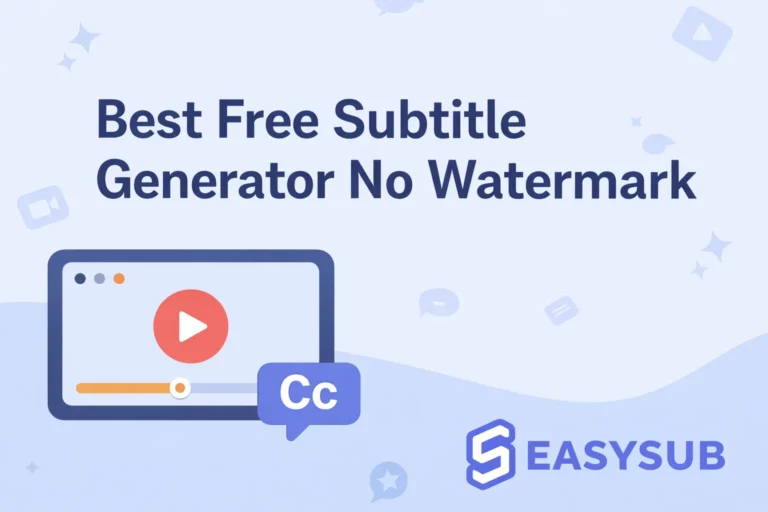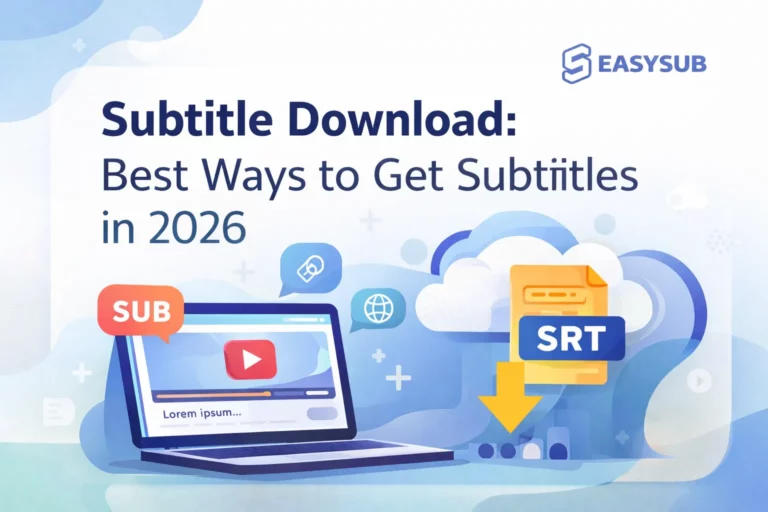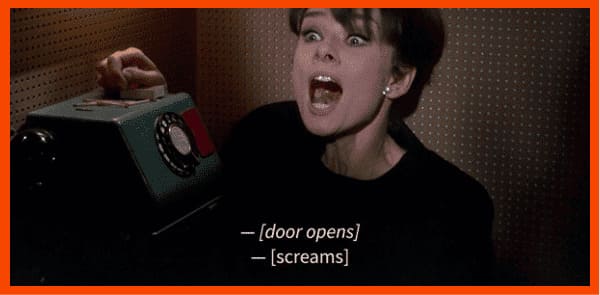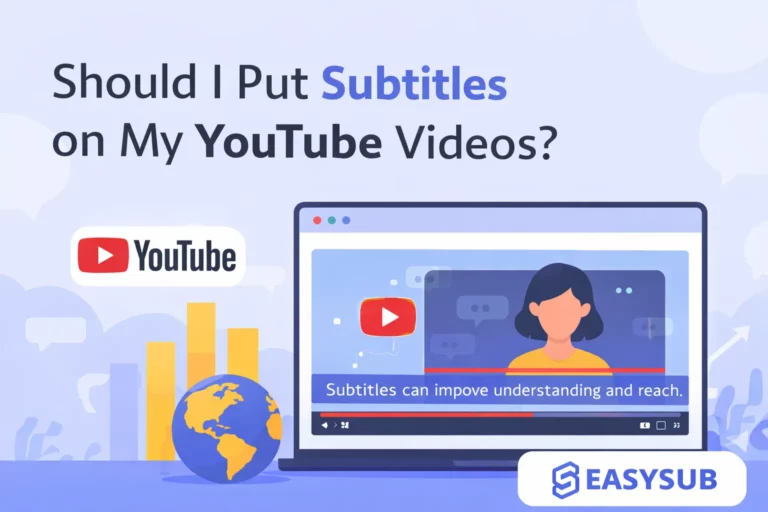V času, ko se globalne vsebine širijo vse pogosteje, imajo japonske video vsebine – pa naj gre za anime, izobraževalne programe, filmske in televizijske produkcije ali poslovne predstavitve – veliko občinstvo v tujini. Vendar je jezik vedno predstavljal komunikacijsko oviro. Kako ustvariti angleške podnapise za japonski video je postalo pereče vprašanje za ustvarjalce vsebin in podjetja.
Tradicionalni postopek izdelave podnapisov običajno vključuje ročno narekovanje, prevajanje in časovno kodiranje, kar ni le zamudno in delovno intenzivno, temveč je tudi težko hitro obvladati veliko količino vsebine. Na srečo nam je današnji napredek tehnologije umetne inteligence zagotovil pametnejšo rešitev.
Kazalo vsebine
Težave pri prevajanju japonskih podnapisov v angleščino
Prevajanje japonskih video vsebin v angleške podnapise se morda zdi le “pretvorba jezikov”, vendar dejansko vključuje več izzivov, kot so semantično razumevanje, kulturne razlike in standardi oblikovanja podnapisov. Brez uporabe profesionalnih orodij ali ročne postprodukcijske optimizacije podnapisi morda niso tekoči, imajo velika odstopanja v pomenu ali jih ni mogoče sinhronizirati.
Težava 1: velika razlika v jezikovni strukturi in popolnoma drugačen besedni red
Japonska slovnična struktura je običajno “subjekt + objekt + glagol”, angleška pa “subjekt + glagol + objekt”. Na primer:
Japonsko: “私は映画を見ました。.”
Slovenski prevod bi moral biti: “Gledal sem film.” (besedni red se popolnoma spremeni)
Prevajalski sistemi umetne inteligence morajo reorganizirati semantiko in ne le prevajati besedo za besedo, kar je velik izziv za običajne sisteme strojnega prevajanja.
Težava 2: dvoumnost častnih besed in tonov, prevod mora biti nameren in ne neposreden
V japonščini je na primer veliko častnih imen, kratic in “kontekstualnih namigov”:
Izvirni stavek: “おっしゃっていましたね。”".
V angleščini ni hierarhije častnih izrazov ena proti ena, zato bi jo morali prevesti kot preprost, naraven izraz: "“To ste omenili že prej.“
Zato mora prevod podnapisov natančno prenesti izvirni pomen in hkrati ohraniti naravno izražanje v angleščini, da bi se izognili prevajalskim poudarkom ali nesporazumom.
Težavnost 3. Vsebine so pogosto izpuščene in zahtevajo umetno inteligenco za razumevanje konteksta
V japonščini je predmet pogosto izpuščen, zato se mora poslušalec pri sklepanju zanašati na kontekst. Primer:
Izvirni stavek: “昨日行きました。.” (brez navedbe “kdo” je šel)
Pravilen angleški izraz bi bil: “Včeraj sem šel.” ali “Včeraj je šel.” Umetna inteligenca mora to ugotoviti iz konteksta.
To postavlja višje zahteve glede razumevanja konteksta. avtomatiziran sistem za ustvarjanje podnapisov.
Težavnost 4. Podnaslov in časovne omejitve, izražanje mora biti jedrnato in jedrnato
Video podnapisi imajo omejeno število znakov in čas prikaza (običajno 35-42 znakov na vrstico, v dveh vrsticah). Pri pretvorbi iz japonščine v angleščino, se število besed povečuje. Rezultat:
- Dolgi podnapisi, ki so predolgi, da bi jih gledalec lahko prebral.
- Vsebina je okrnjena, pomen pa nepopoln
Zato mora umetna inteligenca med prevajanjem uskladiti dolžino jezika in hitrost branja, da bi ustvarila podnapise, ki so natančni in enostavni za branje.
Težavnost 5. Govorjeni in pisni jezik se zelo razlikujeta, zato je treba poenotiti slog podnapisov.
Govorjene izraze (npr. “えーと”, ‘なんか’, “ですよね”) itd., ki se pogosto pojavljajo v japonskih videoposnetkih, je treba prevesti v angleške podnapise:
- Odstranite nepomembne besede
- pretvorite v jasne, jedrnate in razumljive izraze.
- Ohranite dosleden slog podnapisov, da se izognete nepregledni vizualni izkušnji.
Človeški prevod proti podnapisom, ki jih samodejno generira umetna inteligenca: kaj je boljše?
Pri ustvarjanju angleških podnapisov za japonske videoposnetke se veliko ljudi spopada s ključnim vprašanjem: ali naj se odločijo za ročno prevajanje + podnapisovanje ali naj uporabijo orodja umetne inteligence za njihovo samodejno ustvarjanje?
Oba pristopa imata svoje prednosti in slabosti ter sta primerna za različne potrebe.
| Kategorija | Ročno prevajanje | Ustvarjanje podnapisov z umetno inteligenco (npr. Easysub) |
|---|---|---|
| Natančnost | Visoka (upoštevanje konteksta, kulturno natančno) | Visoka (primerno za splošno vsebino, morda bo potreben pregled) |
| Učinkovitost | Nizka (zamudno, delovno intenzivno) | Visoka (samodejno v minutah) |
| Stroški | Visoka (zahteva človeško transkripcijo in prevajanje) | Nizka (avtomatizirano in razširljivo) |
| Prilagodljivost | Slabo (ni idealno za velike potrebe) | Odlično (paketna obdelava, večjezična podpora) |
| Najboljši primeri uporabe | Premium vsebine, filmi, dokumentarni filmi | Izobraževalne vsebine, družbeni mediji, usposabljanje |
| Enostavnost uporabe | Potrebna so strokovna znanja in spretnosti. | Začetnikom prijazno, naložite in pojdite |
Zaključek
Če vaša video vsebina zahteva visoko stopnjo jezikovne natančnosti, kulturne reprodukcije ali nadzora sloga blagovne znamke. Na primer za filme, dokumentarne filme ali oglaševalske kampanje je človeški prevod še vedno primernejša izbira.
Toda za veliko večino vsakdanjih ustvarjalcev videoposnetkov, ponudnikov izobraževalnih vsebin in komunikacijskih oddelkov podjetij so orodja za samodejno ustvarjanje podnapisov z umetno inteligenco, kot so Easysub imajo pomembne prednosti z vidika učinkovitosti, stroškov in enostavnosti uporabe. Ne samo, da lahko zaključi integrirano obdelavo “diktiranje + prevajanje + časovna koda” v nekaj minutah, podpira pa tudi večjezični izpis, kar močno izboljša učinkovitost dela in učinek videoposnetka.
Zato je najboljša praksa, da kot osnovo uporabite samodejno generiranje podnapisov Easysub in ga nato združite s potrebnim človeškim lektoriranjem, da dosežete obojestransko koristni učinek “učinkovitost + kakovost”.
Vodnik za uporabo Easysub: Kako samodejno ustvariti angleške podnapise z umetno inteligenco?
Ne glede na to, ali ste začetnik ali izkušen ustvarjalec podnapisov, Easysub omogoča hitro in enostavno ustvarjanje podnapisov. V le nekaj korakih lahko japonski videoposnetek spremenite v mednarodno vsebino s profesionalnimi angleškimi podnapisi v nekaj minutah, brez ovir za vstop.
Korak 1: Registracija računa
Obiščite spletno stran Spletna stran Easysub, kliknite gumb “Registracija” ali “Prijava” v zgornjem desnem kotu. Za hitro registracijo lahko uporabite e-pošto ali pa se z enim klikom prijavite prek računa Google. Za začetek uporabe vam ni treba plačati.
Korak 2: Naložite japonski videoposnetek
Po vnosu ozadja kliknite gumb “Dodaj element” in naložite videoposnetek:
- Podpira nalaganje lokalnih datotek (povleci in spusti ali izberi s klikom)
- Za uvoz video vsebine lahko neposredno prilepite tudi povezavo do videoposnetka YouTube.
- Podpira formate MP4, MOV, AVI in druge glavne video formate.
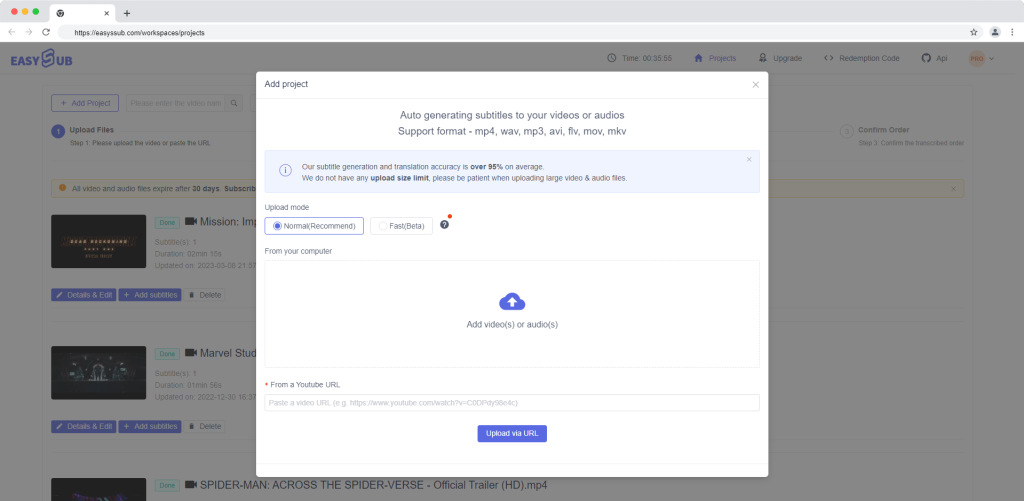
Korak 3: Dodajanje podnapisov
Po prenosu videoposnetka kliknite gumb “Dodaj podnapis”, nato pa boste morali izbrati konfiguracijo za ustvarjanje podnapisov.
- Kot izvirni jezik izberite “japonski”.
- V možnosti “Jezik prevoda” izberite “angleščina” (ali kateri koli drug jezik).
- Potrdite in kliknite “Start Generation”.
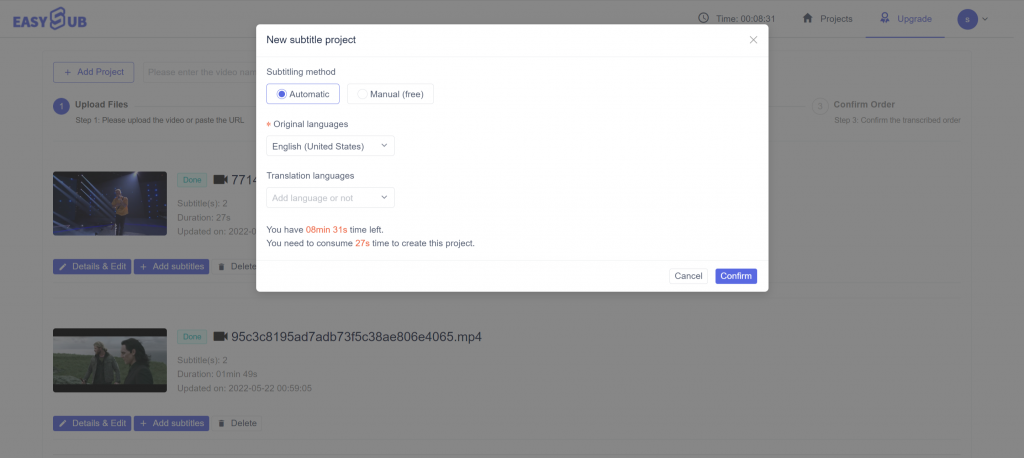
Korak 4: Samodejno prepoznavanje in prevajanje z umetno inteligenco (traja le nekaj minut)
Easysub bo samodejno:
- izvajanje prepoznavanja govora (ASR) v videoposnetkih
- Pretvarjanje prepoznane japonske govorne vsebine v besedilo
- Prevajanje podnapisov v angleščino s pomočjo prevajalnika z umetno inteligenco
- Samodejno uskladi časovno kodo za sinhronizacijo podnapisov z zaslonom
Celoten postopek traja le nekaj minut, brez potrebe po ročnem vnosu, poravnavi ali prevajanju.
Korak 5: Izvozite podnapise ali sežgite v videoposnetek
Po končanem urejanju kliknite gumb “Izvozi”, lahko izberete:
- Izvozite datoteke .srt, .vtt, .ass in druge standardne formate podnapisov, ki so primerni za vse platforme.
- Izberete lahko tudi možnost “Burn Subtitles”, da podnapise vstavite neposredno v videoposnetek in jih enostavno objavite v družabnih medijih (npr. TikTok, YouTube).
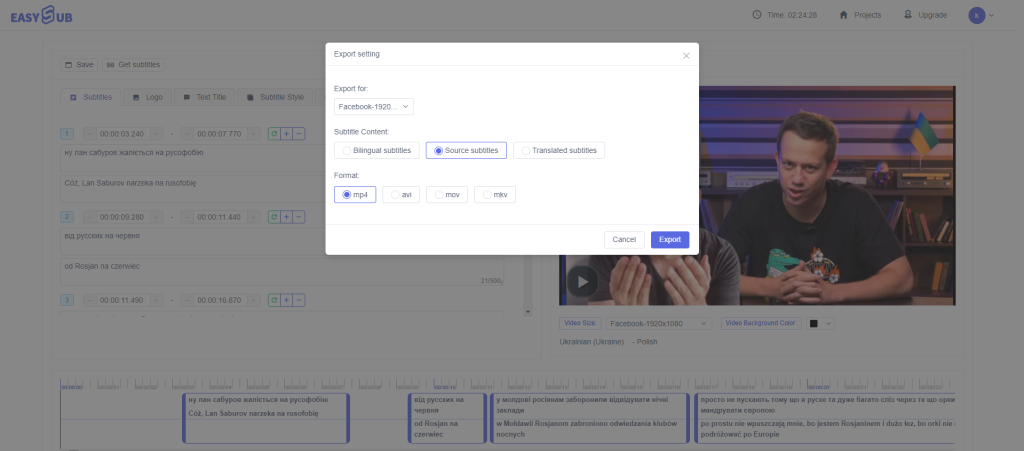
Želite ga preizkusiti zdaj?
Kliknite tukaj in pojdite na: easyssub.com
Naložite enega od svojih japonskih videoposnetkov in v nekaj minutah ustvarite natančno sinhronizirane angleške podnapise!
Kako lahko izboljšam natančnost prevajanja samodejnih podnapisov?
Čeprav imajo sodobna orodja za ustvarjanje podnapisov z umetno inteligenco (kot je Easysub) že zelo visoke zmogljivosti za prepoznavanje govora in prevajanje. pa lahko uporabniki za doseganje natančnejših, bolj naravnih in profesionalnih rezultatov angleških podnapisov dodatno optimizirajo kakovost podnapisov z uporabo naslednjih nasvetov.
- Uporaba visokokakovostnih zvočnih virov: Natančnost prepoznavanja govora je zelo odvisna od jasnosti zvoka.
- Poskusite uporabljati standardne japonske izraze, da se izognete motnjam z naglasom.: Čeprav Easysub prepoznava različne naglase, je standardna japonščina vedno najbolj natančna.
- Izberite pravo jezikovno konfiguracijo: Pri nalaganju videoposnetkov se prepričajte, da so jezikovne nastavitve izbrane kot izvorni jezik “japonščina” + ciljni jezik “angleščina”.
- Izvedite hitro ročno preverjanje in popravke po generiranju: Tudi če je umetna inteligenca ustvarila visokokakovostne podnapise, je priporočljivo opraviti hitro ročno popravljanje.
Čeprav je samodejno prevajanje podnapisov blizu profesionalni ravni, je trenutno najbolj idealen način izdelave podnapisov “AI Generation + Human Optimization”. S temi tehnikami je mogoče znatno izboljšati natančnost in berljivost končnega izpisa.
Z Easysubom, za ustvarjanje podnapisov in optimizacijo vsebine potrebujete le nekaj minut in vaši videoposnetki bodo zlahka profesionalno podnaslovljeni v angleščini.
Zakaj izbrati Easysub?
Ko želite ustvariti angleške podnapise za japonske videoposnetke, zakaj je Easysub idealna izbira, ko se soočate s številnimi orodji za podnapise?
Ker Easysub ni le “generator podnapisov”, to je resnično inteligentna rešitev za video jezik, zasnovana za ustvarjalce po vsem svetu. To je resnično inteligentna rešitev za video jezik, zasnovana za ustvarjalce po vsem svetu. Združuje štiri ključne prednosti: hitrost, kakovost, izkušnje in stroške..
- Hitro in učinkovito: ustvarjanje visokokakovostnih podnapisov v nekaj minutah
- Podpora samodejnemu prevajanju v več jezikov: pomaga vam doseči globalne uporabnike.
- Izkušnje s profesionalnim urejanjem s popolno vizualizacijo
- Nižji stroški, primerno za posameznike in ekipe podjetij
- Enostavna uporaba, brez praga, tudi za začetnike.
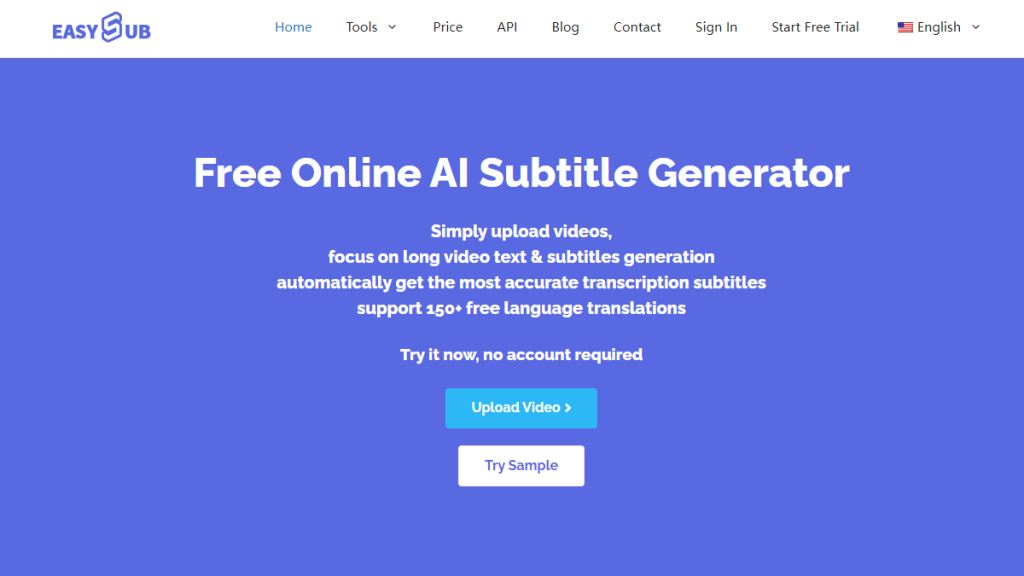
Če iščete način za učinkovito in natančno ustvarjanje angleških podnapisov za japonske videoposnetke, je Easysub najbolj zanesljiva izbira za vas. Ne glede na to, ali delate na videoposnetkih z navodili, vsebinah za YouTube, samozaložbi, promocijah podjetij ali čezmejnem usposabljanju, Easysub omogoča enostavno in profesionalno podnaslavljanje.
Začnite uporabljati EasySub za izboljšanje svojih videoposnetkov še danes
V dobi globalizacije vsebin visokokakovosten videoposnetek ne potrebuje le dobre grafike, temveč tudi natančne in naravne večjezične podnapise, da doseže globalno občinstvo. Ustvarjanje angleških podnapisov za japonske videoposnetke se morda zdi zapleteno, vendar je z orodji umetne inteligence v resnici preprosto in učinkovito.

Ta članek vam ponuja pregled pogostih izzivov pri prevajanju podnapisov, primerjavo med ročnimi in umetno inteligenco zasnovanimi metodami ter popoln vodnik in nasvete za optimizacijo, ki temeljijo na Easysubu. Prepričan sem, da ste se že naučili, da z Easysubom ne potrebujete izkušenj s podnapisi, da bi hitro ustvarili profesionalne angleške podnapise, kar bo drastično povečalo doseg in mednarodni vpliv vaših videoposnetkov.
Naj umetna inteligenca v le nekaj minutah opolnomoči vašo vsebino!
👉 Kliknite tukaj za brezplačen preizkus: easyssub.com
Hvala, ker ste prebrali ta blog. Za dodatna vprašanja ali potrebe po prilagoditvah nas prosim kontaktirajte!
-r7te9qv3oa3431pimkjji8758ss4dmzt4un2tkso1k.png)
